
Students choose from traditional, online, hybrid, trades pathways
EDITOR'S NOTE: This story originally appeared in the November 2023 issue of GCU Magazine. Digital version
Story by Mike Kilen, Mark Gonzales and Lana Sweeten-Shults
His wife picked him up from the Florence, Arizona, prison and drove directly to their children’s school. He would call them from lockdown, where he was alone most of the time because of prison gang involvement, but during those conversations, he felt like he’d let them down.
Santiago Mendoza, 44, had been waiting for the day in 2021 that he would get a second chance after serving two stints in prison since 2010 for weapons offenses and selling drugs. During the latter stay, he found his faith and woke up inside.
“It hit me, man, what am I doing? I need to grow up and be a man,” he said. “I gave my life to the Lord and followed Jesus. I got sober.
“I am here now.”
He’s there, picking up the children – three of his five who live with him. Going home with wife Michelle to his north Phoenix rental home. Starting over.
After a low-paying factory job, he heard about a Grand Canyon University program that began to change his life trajectory – the Pre-Apprenticeship for Electricians – and in January 2023, the high school dropout found himself on a college campus.
College is somewhere he never thought he would be.
But GCU has created ways for education to fit into everyone’s life, including a trades pathway.
University President Brian Mueller sees higher education as fulfilling a promise to create equal opportunity.
“America never promised equality,” he said. “America promised equality of opportunity. You can work as hard as you want or not – that’s up to you. But you should have the opportunity.”
For GCU, that means meeting students wherever they’re at in life.
It means giving them many ways to access education, and not just when they’re 18 years old and fresh out of high school.
It means educating them even when they’re not on campus or educating them even if what they’re studying isn’t what universities typically teach.
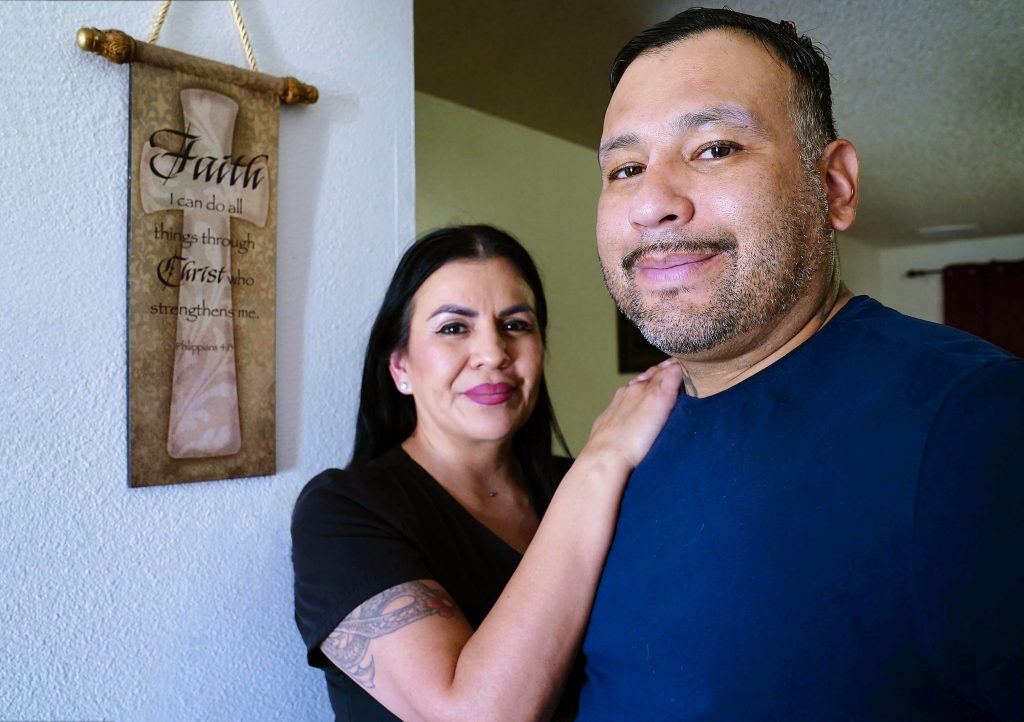
When GCU rolled out the trades program for electricians in 2022, Dr. Joe Veres, GCU’s Senior Vice President of Student Success, said people told him: “I can’t believe GCU is doing this. Finally, a university is stepping alongside the trades and finding a clear path for them that will support them.”
Taking that step with GCU was a clear path for Mendoza.
During his time on campus, he would go to the gym and play pool at Thunderground with the younger guys – most in the program are younger than age 30, and 53% are Latino. They would go to classes to learn math, English and the basics of electrical work.
Earlier, he would train with electricians, trading a prison’s orange jump suit for a yellow safety vest and hard hat.
“We have students who have been down and out, and they come here and receive some encouragement and some counseling and get back on track,” said Mickey Nuñez, who manages the trade programs with Shelly Seitz in the GCU Center for Workforce Development, including the new manufacturing certificate for computer numerical control machinists. “It wasn’t an easy track, even when they got here. They are trying to fix themselves, and now they are saying this is the most money they’ve ever made.”
Many of the 74 who earned a certificate in the 15-week program last fall and spring, including Mendoza, are already working as apprentices, often with program partners Rosendin Electric and Corbins Electric. They can earn more than $50,000 annually, Seitz says, and in a few years, $85,000 as midrange journeymen “and with overtime are making over $100,000.”
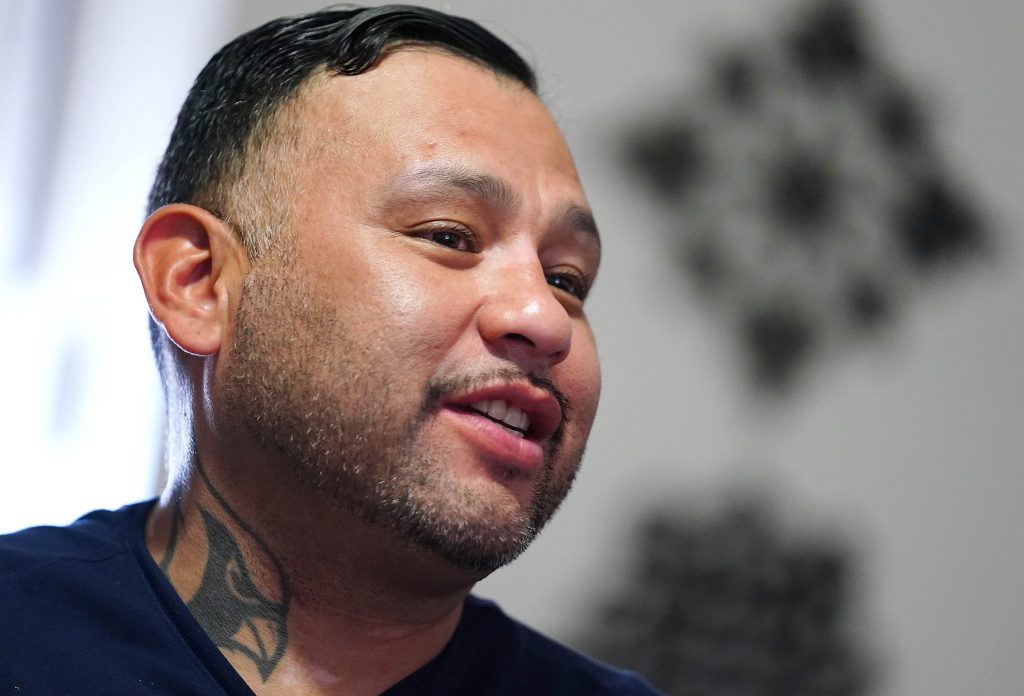
Currently, 118 are part of the third cohort of aspiring electricians, and 120 are scheduled to start in January 2024.
Mendoza had to get past issues with math; he hadn’t done it for a while, though he earned a GED in prison. And he had to overcome bad memories, which included the deaths of his father in a bar fight and his brother while in the same bad crowd, he said.
“(Faith) gave me a new outlook on life. It shed a light on all the things I was holding in,” he said. “It gave me a path and direction.”
In May, he took another drive – this time to GCU with his children, where they watched him rise to gather his certificate of completion. He never dreamed he would be standing there after more than eight years in prison.
Within a month, Mendoza joined the Phoenix Electrical Training Alliance to begin an apprenticeship. He is earning $24 an hour after incentives at the Taiwan Semiconductor Manufacturing Company in Phoenix, joining six others from the GCU program working at the site.
“It’s the most I’ve ever made on a job,” he said of working six days a week and studying electrician courses. “It’s already changing my life in a big way, financially and even in a spiritual way, to keep on the right track and keep moving forward.”
Michelle put her arm on Santiago’s shoulder, that drive from the prison distant memory. “He is a changed man,” she said.
Nursing a passion
The trades aren’t the only way GCU is helping students access education.
Mueller has spoken of four educational delivery methods the University has created: a traditional avenue for just-out-of-high-school students who attend classes on the ground campus; a route for students who study online and may never step on the Phoenix campus until they graduate; the certificate program for the trades; and a hybrid option combining online and on-site, hands-on learning.
“We’re focused on, how can we help people across their lifespan and across the socioeconomic strata of our society? How can we help them access education that makes society more equitable?” Mueller asked.
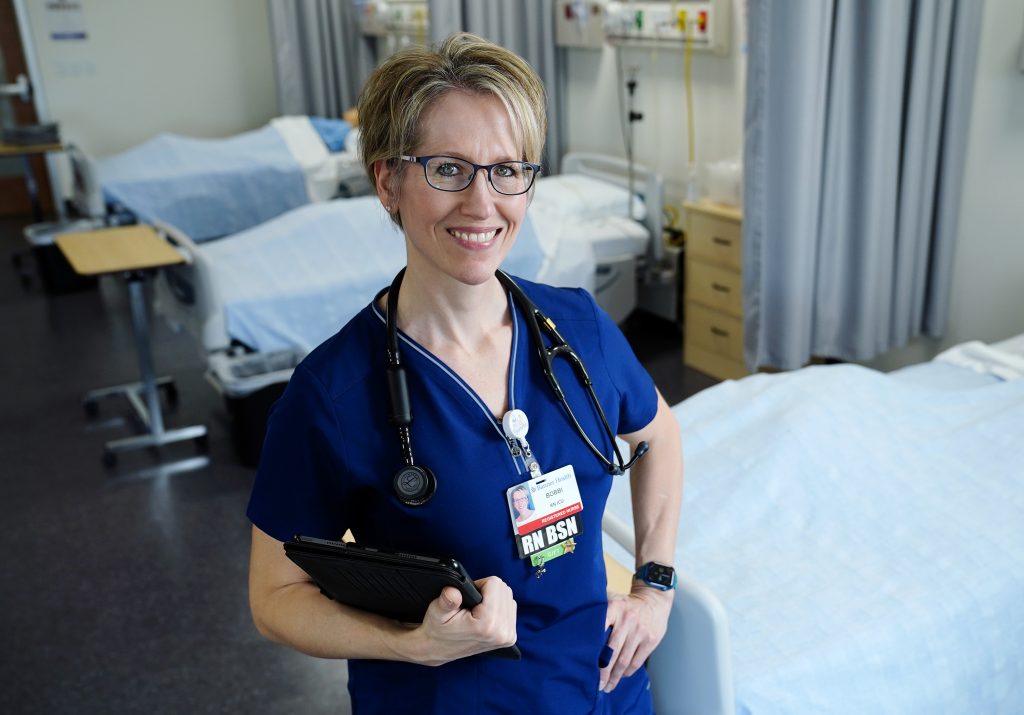
It’s important to deliver education in a way that’s “very specific to the life situation of the student and the nature of what it is they have to learn,” Mueller added.
Bobbi Jo Stevenson was driven to learn nursing, a profession that always played in the background of her life.
She heard it.
But she didn’t listen to the symphony of it, even when her son, who has a heart condition, found strength in the nurses who would rally around him.
Frankly, she was scared to become a nurse, although her mother was one. The profession was a comfortable blanket that enveloped her family’s life, but Stevenson never thought she could make it through the science.
So she listened to the melody of another profession, earning her bachelor’s degree in psychology from Drake University in 2000, then delving into medical research in the Department of Psychiatry at the University of North Carolina.
A research job at Toronto General Hospital followed. She worked with a group of cardiac anesthesiologists.
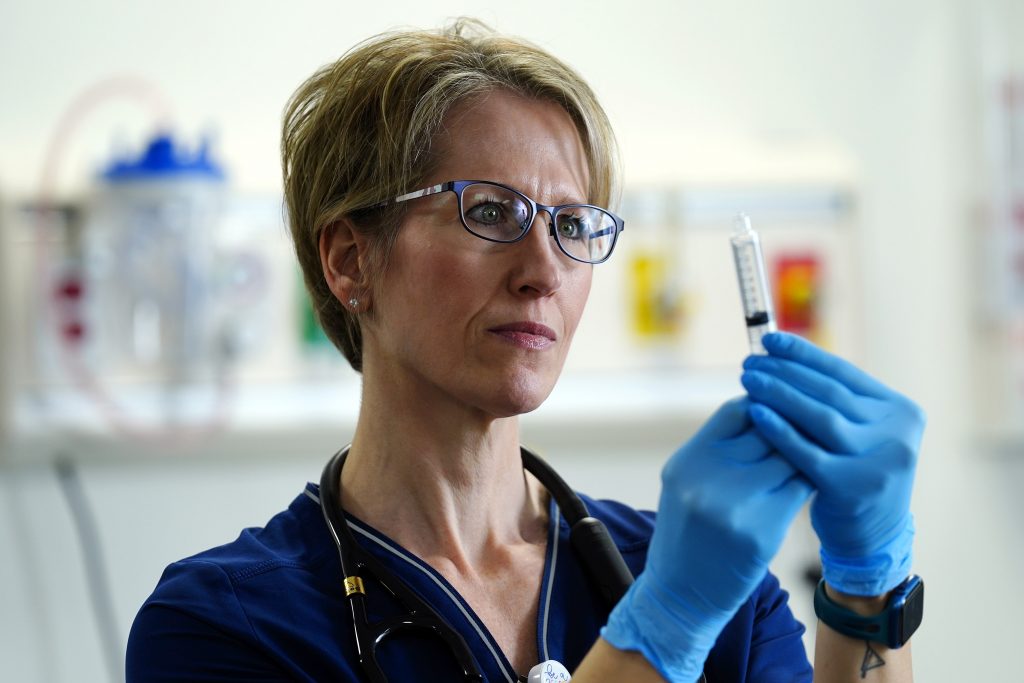
“I was in and out of the operating room, and in and out of the cardiovascular ICU, and then on the floor seeing patients before they were discharged.
“I loved ALL of it,” she said.
When she left that job, she turned to her manager and asked for a letter of recommendation when the time came for her to apply to nursing school.
“I love to say that because that was 20 years ago, prior to me actually going to nursing school.”
She boldly decided to leave California for Phoenix with her partner and four children so she could study at GCU’s Accelerated Bachelor of Science in Nursing site in Sun City. The ABSN pathway is a hybrid program that’s an example of another way GCU delivers education. During the 16-month program, students take didactic courses online, then head to a lab site for hands-on work in skills and simulation labs.
The program is designed primarily for non-nursing degree students who are re-careering.
GCU’s six ABSN sites (four in Arizona, one in Nevada and one in Utah) are expected to grow to 40 over the next five years as part of the University’s effort to stem a national nursing shortage. Approximately 1.5 million additional nurses will be needed in the U.S. in the next five years, according to the Bureau of Labor Statistics.
What finally pushed Stevenson to take that leap of faith was her son, who was just 18 days old when his heart condition sent him to the ICU. He struggled to breathe for two months.
He struggled even more when he was administered 10 times the amount of medication he was supposed to be given.
Stevenson got to know the nurses by name.
“I know what it’s like to be on the other side. I know what it’s like to be scared,” she said.
That’s what’s going to make her a great nurse, and the ABSN program is getting her there.
What she loved about it is that, with four children, she wanted a least-disruptive-as-possible program that she could complete quickly and would allow her to study at home. She wanted a program that didn’t require her to be at a lab site all week, though she knows hands-on learning is essential for nurses: “You can’t learn how to put in a Foley catheter online,” she said.
“It (the hybrid model) really is the reason I chose it,” she said of the program. “I needed to be learning from my home space and with my family as much as possible.”
Stevenson routinely studied 70 hours a week.
“It’s been very challenging. I don’t think you’re going to find anybody in that accelerated program that will say any different.”
Stevenson, who graduated from the Sun City ABSN site in April, began her new career in July as an ICU nurse at Banner Desert Medical Center in Mesa.
After hearing nursing calling her for more than two decades, she finally answered.
Teacher nurtured online
Julie Wakeman heard her calling in education.
After graduating from high school in 2009, she couldn’t find the right fit and walked away from college … twice. She settled for working at a bank for 4½ years but walked away from that, too, finally taking a job as a teaching assistant.
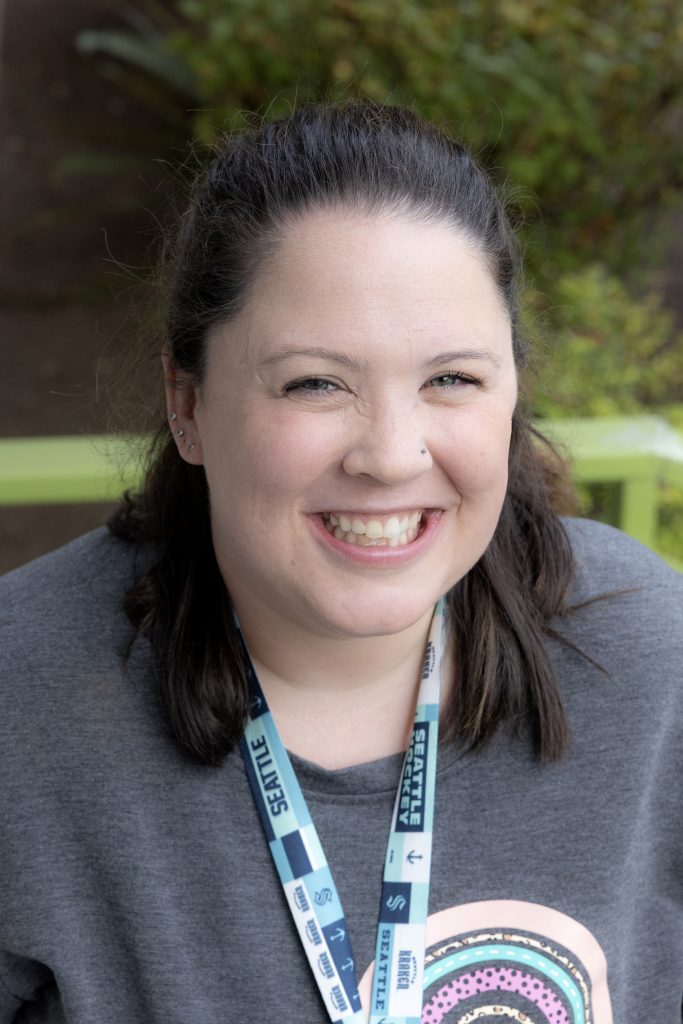
Then she heard about GCU’s online program – another education pathway to meet students where they’re at in life. She contacted the University and traveled from Washington to Phoenix to visit the campus.
Wakeman jumped from teaching assistant to licensed teacher, earning both her bachelor’s degree in early childhood education and her master’s in curriculum and instruction online.
Dr. Meredith Critchfield, Dean of the College of Education, said almost all of the college’s programs have a version offered online with the exception of hands-on practicum and student teaching experiences that are critical to work in the field.
“The truth of the matter is that we are in a severe educator shortage, and many Americans are up against significant financial challenges, so those who are looking to earn an education degree often can’t leave their part- or full-time roles in schools,” Critchfield said.
“They need the affordability and flexibility of an online program so they can stay in their current role while completing a good portion of the requirements for their degree online. GCU makes that a reality for many of our students.”
The University’s online student body numbers more than 90,000 – more than three times the ground campus number of 25,000-plus students.
Mueller added, because of the stressful economy, “We are seeing more traditional college-age students who are choosing to save money and take classes remotely. These students may come to campus eventually or many decide to do the entire program from home. Either way, because of our experience and expertise in online and hybrid learning platforms, we are uniquely positioned to respond to this growing trend.”
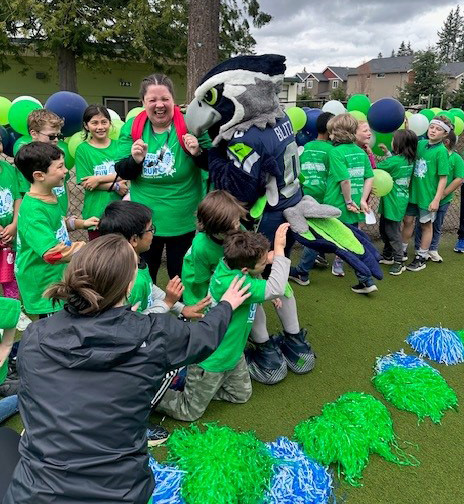
The University made earning a degree a reality for Wakeman, whose passion was never put to the test as much as it was when she was trying to complete her bachelor’s while teaching prekindergarten classes and preparing for the birth of her son, Grayson, during COVID.
“And he was a toddler while I was working on my master’s degree,” said Wakeman, a first grade teacher at Brighton School in Mountlake Terrace, Washington, who completed her master’s degree requirements in September. “I had to figure out that balance between school, work and family.”
Teaching during COVID, she said, “was more than we expected and more than academics. It was just bringing these kids back into being social and being able to work with peers since they were at home for a large chunk of time with just their parents.”
Wakeman said GCU altered its student teaching program during COVID, allowing her to use her classroom to complete her student teaching. Video enabled her to show teachers how she was performing in front of students while getting feedback through Zoom meetings.
“The nice thing about Grand Canyon’s online program is that I had so much support from counselors and teachers if I needed extra support and being right there, as if I was in a classroom.”
The nice thing about Grand Canyon's online program is that I had so much support from counselors and teachers ..."
Julie Wakeman
She hopes earning two degrees in her 30s after struggling to find her niche and raising a child will be an example to her son.
“My real goal after having my son was just showing him that you can do anything you really want. Once you find that career you know you’re passionate for, school makes that much of a difference to balance that out.” GCU’s online program made a big difference for her, meeting her where she was at in her life.
A scholarship opportunity
Gael and Javier Solis are brothers born to Mexican immigrant parents who met each other in church and had Javier 20 years ago, the next year, Gael.
Their dad cleans carpets in Phoenix for a living. He told Javier and Gael they couldn’t work when they asked at age 16. Education is the best route, he told them. Don’t worry about money. Study.
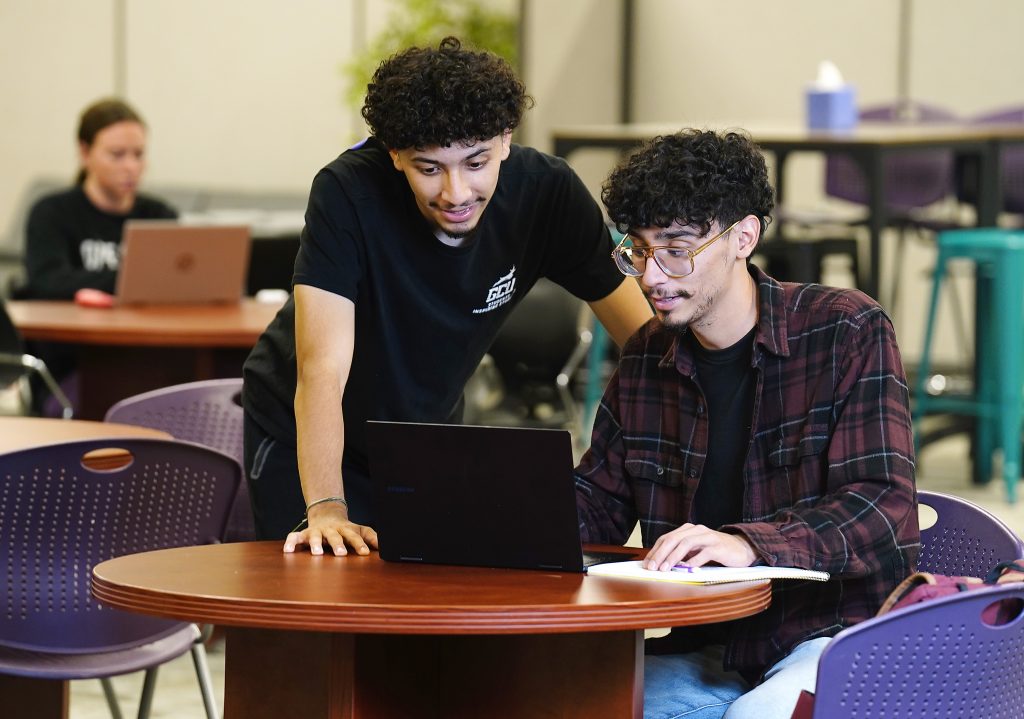
But when they looked at college costs, their mother’s face fell. It was too expensive. They would need to work long hours while going to college, or not go at all.
They were good students at Trevor G. Browne High School and heavily involved at church, each giving young children music lessons as a way to help them find strength in faith. Yet, such promising young men might not be able to go to college.
Their life changed in 2020, just 15 minutes from their home.
GCU awarded the Solis brothers Students Inspiring Students scholarships. The full-tuition scholarships have so far helped 734 local families in need realize their dreams with a college education.
The scholarships are one avenue to that equality of opportunity Mueller speaks about – opportunity students can access in whatever way they need to, whether online, through a trades program, a hybrid program or on-ground as a traditional student, like the Solis brothers.
Javier brought his passion to be a physician to GCU in 2020, while Gael started his quest the next year to one day be a counselor. Both major in psychology, though Javier’s emphasis is in pre-med. Gael said he’s always been a listener, one who wanted to help others.
“I always have this optimism about situations, to just keep moving forward. I also like incorporating my religious background and how God has helped me with everything. Many times in life I felt stuck, and I kept going back to God.”
Javier loved learning about and educating people on their bodies, and how what is going on physically is linked with what is going on mentally.
SIS leaders say they saw just what promise these brothers had to give back to the world – and to their family, who is watching the first among them to ever go to college.
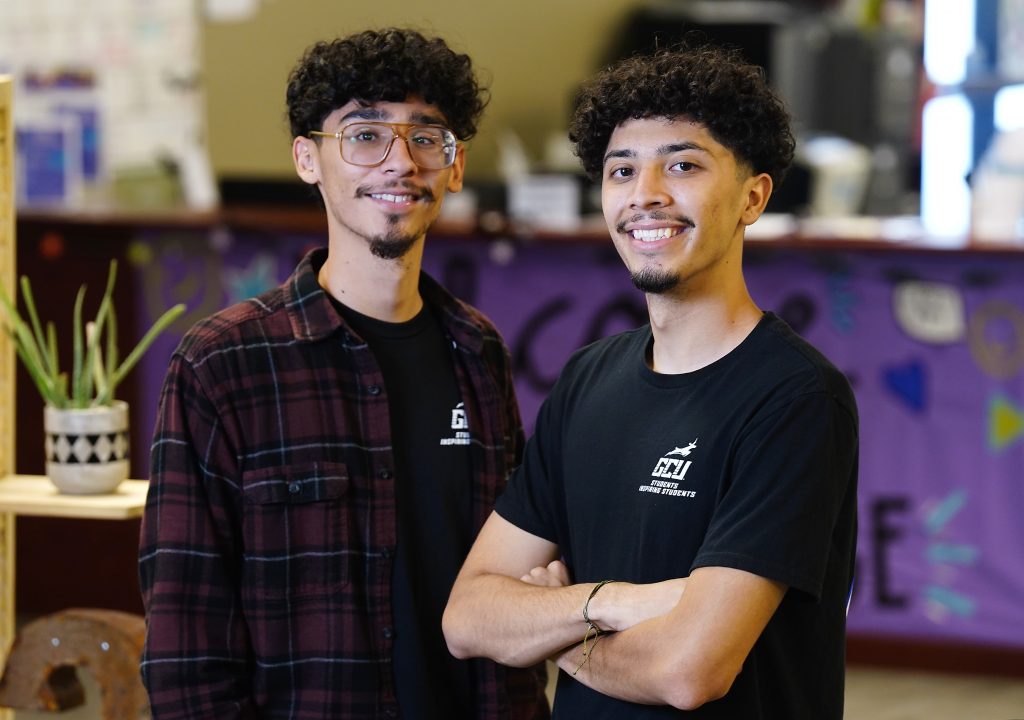
The family had seen their character in the Army For Christ Ministries. Javier takes his guitar and bass every Tuesday to teach children and lead worship, while Gael teaches them drums and piano. People think they are twins, they look so much alike, but while Javier spends his time at internships at a shelter and as a nursing assistant, Gael plays on the club soccer team at GCU.
Their love of music is shared, however. “It’s a different language,” Gael said. “It sets a different atmosphere when you are set to make music together.”
“It is very poetic,” added Javier. “It makes me emotional, hearing all these voices and harmonies.”
They feel comfortable at GCU, strolling the campus at night and seeing all the students gathering to play or study. It feels like home, they both said.
“Honestly,” Gael said, “I’d say it’s life changing. If not for this, I’m probably ...”
“Working,” Javier said, finishing his sentence.
The quality of these young men is not only found on campus but on their annual trip to Hermosillo, Mexico, to help the poor.
Sometimes they are in churches without a roof, playing an old piano, watching the children raise their hands in the open air to praise God.
“They have a good heart for people,” said Teodoro Medillin, the youth pastor at Army For Christ. “I’ve witnessed this firsthand. Gael and Javier literally take their own clothes off and give it to the kids there.”
And as much as they give to everyone else, GCU is giving to them, offering a way, whether traditional, online, hybrid or through the trades, to earn a degree or certificate
Offering an education to everyone.



































































